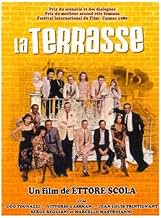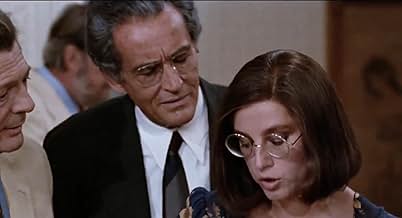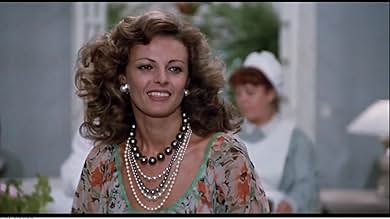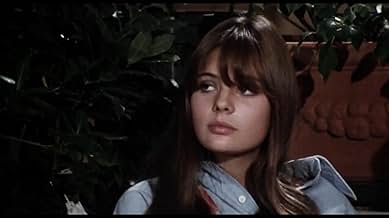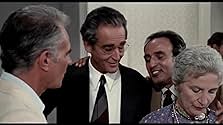Lors d'un dîner sur une terrasse romaine, les vies et les expériences de plusieurs personnages s'entremêlent.Lors d'un dîner sur une terrasse romaine, les vies et les expériences de plusieurs personnages s'entremêlent.Lors d'un dîner sur une terrasse romaine, les vies et les expériences de plusieurs personnages s'entremêlent.
- Réalisation
- Scénario
- Casting principal
- Récompenses
- 5 victoires et 1 nomination au total
Jean-Louis Trintignant
- Enrico D'Orsi
- (as Jean Louis Trintignant)
Agenore Incrocci
- Vittorio
- (as Age)
Leonardo Benvenuti
- Un ospite
- (as Leo Benvenuti)
Avis à la une
Ettore Scola has made at least two great films, C'eravamo tanto amati and Une giornata particolare. But this time he got carried away. It's not enough to put 20 great actors in a room to end up with a masterpiece. Call it self- indulgent, call it intellectual masturbation, I call it boring. Sorry, Ettore.
Good opportunity to see once again Scola's great sense of criticism and love for Italian contemporary society, mixing in a tragicomic way politics, middle-age crisis, failing marriage, love, infidelity, suicide, friendship, the rôle of intellectuals. His great ensemble direction rivals Robert Altman's. And just have a look at that cast - Mastroianni (effective as always), Trintignant (always so surprising), Tognazzi (in charge of his difficult rôle), Gassman (what a superb actor!), Reggiani (moving), the lovely Stefania Sandrelli and a débutante very young Marie Trintignant. For those who like Italian cinema and politically oriented films with a touch of humor. 8/10
Commedia all'Italiana had pretty well run its course by the time Ettore Scola made this film but its dark humour, scathing social satire and colourful characters certainly qualify it as typical of that particular genre. One is hardly surprised as the award-winning script is by the redoubtable duo of Age and Scarpelli whilst the cast is headed by three of the greatest male practitioners of Italian comedy, namely Marcello Mastroianni, Vittorio Gassman and Ugo Tognazzi. The absent Alberto Sordi gets a mention! As a bonus there are beautifully observed portraits of a deranged writer by Jean Louis Trintignant and a depressed pen-pusher by Serge Reggiani. On the distaff side Stefania Sandrelli proves once again that she is more than just a pretty face by picking up a Nastro d'Argento for her performance as Gassman's lover and as Mastroianni's ex-wife the elegant Carla Gravina was recognised at Cannes.
Although not Scola's greatest this is still the work of a master film-maker, is eminently watchable and fully justifies its length. The inexorable passing of time with its painful regrets, the fragility of relationships and the frailties of humankind as depicted here cannot fail to strike a chord and we are furthermore treated to a level of artistry from the principals that belongs to a vanished era.
Although not Scola's greatest this is still the work of a master film-maker, is eminently watchable and fully justifies its length. The inexorable passing of time with its painful regrets, the fragility of relationships and the frailties of humankind as depicted here cannot fail to strike a chord and we are furthermore treated to a level of artistry from the principals that belongs to a vanished era.
We follow five friends at the same party. A writer, a producer, a director, a politician and a journalist. There they meet new and old flames and quarrel a bit. All are experiencing an intellectual and emotional crisis.
I loved the many subtle symbols in this film. For instance, the young girlfriends; Sergio who is not eating; the crisis of being a leftist ('I'm much more left-wing than you!'); the success of women.
Even better is Scola's mockery with intellectualism. As you sometimes hear at parties people say: 'Mannerism is out of fashion', and you haven't got an clue what the purpose is of this comment. Every character here thinks himself as being witty, except the producer, and it is precisely him who produces a dramatic masterpiece that is praised by the intellectual elite.
Scola portrays disappointments beautifully - it is seen between the lines, as it was as well in Brutti, sporchi e cattivi. So, I highly appreciated this film, but you have to bear in mind it is a film of almost three hours. A perfect film for a rainy Sunday.
I loved the many subtle symbols in this film. For instance, the young girlfriends; Sergio who is not eating; the crisis of being a leftist ('I'm much more left-wing than you!'); the success of women.
Even better is Scola's mockery with intellectualism. As you sometimes hear at parties people say: 'Mannerism is out of fashion', and you haven't got an clue what the purpose is of this comment. Every character here thinks himself as being witty, except the producer, and it is precisely him who produces a dramatic masterpiece that is praised by the intellectual elite.
Scola portrays disappointments beautifully - it is seen between the lines, as it was as well in Brutti, sporchi e cattivi. So, I highly appreciated this film, but you have to bear in mind it is a film of almost three hours. A perfect film for a rainy Sunday.
Ettore Scola seemed to epitomize Italian cinema in the 70's and early 80's. What great films he did: We All Loved Each Other so much, Ugly Dirty and Bad, A Special Day (for me it's Mastroianni's best), Passion of Love (incredible story of beauty and ugliness), Le Bal, etc. Where directors like Bertolucci and Bellochio seemed to lose their way in political argument, Scola stayed on his feet and created wonderful satires of bourgeois complacency.
The Terrace is too long--almost three hours--and too loaded with characters to have much force. The political and social problems described here seem obscure and distant from us in time. The speech Mario gives to the PCI congress is well done (he's asking for forgiveness for his adultery with Giovanna) but hasn't much dramatic effect. Much better are the little touches: the elderly waiter dragging the wagon over the tile floor, making an awful screeching sound as Luigi and Carla dine; the workmen who reduce the size of Sergio's office in ten seconds flat--wonderful effect; Sergio trying to talk to the head of RAI in the latter's office, with the huge Grecian bust between them, very funny.
I should point out that far too much of the comedy misses its mark and falls flat: I don't know what Scola was trying to do with Enrico's writer's block and the finger in the pencil sharpener. Marie Trintignant appears as eye candy throughout the film and serves no purpose in the story. If you choose to watch this, get ready to hit the fast forward button.
The Terrace is too long--almost three hours--and too loaded with characters to have much force. The political and social problems described here seem obscure and distant from us in time. The speech Mario gives to the PCI congress is well done (he's asking for forgiveness for his adultery with Giovanna) but hasn't much dramatic effect. Much better are the little touches: the elderly waiter dragging the wagon over the tile floor, making an awful screeching sound as Luigi and Carla dine; the workmen who reduce the size of Sergio's office in ten seconds flat--wonderful effect; Sergio trying to talk to the head of RAI in the latter's office, with the huge Grecian bust between them, very funny.
I should point out that far too much of the comedy misses its mark and falls flat: I don't know what Scola was trying to do with Enrico's writer's block and the finger in the pencil sharpener. Marie Trintignant appears as eye candy throughout the film and serves no purpose in the story. If you choose to watch this, get ready to hit the fast forward button.
Le saviez-vous
- AnecdotesSerge Reggiani's character in the movie Is producing a TV adaptation of Théopile Gautier's famous novel "The Captain Fracasse";10 years later, director Ettore Scola will make a movie adaptation of the same novel, titled "CAPTAIN FRACASSA'S JOURNEY"
- Citations
[repeated line]
Hostess at 15° PCI's Congress: Dinner is served. Come!
- ConnexionsFeatured in La strana coppia. Incontro con Age e Scarpelli (2001)
- Bandes originalesConcerto N.8 in La Minore
by Antonio Vivaldi
Meilleurs choix
Connectez-vous pour évaluer et suivre la liste de favoris afin de recevoir des recommandations personnalisées
- How long is La terrazza?Alimenté par Alexa
Détails
- Date de sortie
- Pays d’origine
- Langue
- Aussi connu sous le nom de
- Die Terrasse
- Lieux de tournage
- Foro Piscario, Via della Tribuna di Campitelli, Rome, Lazio, Italie(Mario and Giovanna in the ruins of a Roman monument)
- Sociétés de production
- Voir plus de crédits d'entreprise sur IMDbPro
- Durée2 heures 30 minutes
- Mixage
- Rapport de forme
- 1.85 : 1
Contribuer à cette page
Suggérer une modification ou ajouter du contenu manquant

Lacune principale
By what name was La terrasse (1980) officially released in India in English?
Répondre
